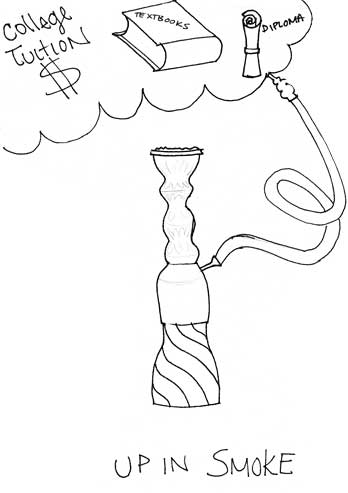Opinion: Federal student aid law sends a poor message

By Liska Koenig
CHIEF COPY EDITOR
U.S. Congressman Mark Souder might live in Indiana, but the affects of his politics are felt right here at City College. In 1998 Souder wrote an amendment to the Higher Education Act of 1965, the Drug-Free Student Loan Amendment, which was passed by Congress and is still valid today.
The so-called “Souder Law” indicates that anyone convicted of possession or sale of illegal drugs while receiving federal student aid, grants, loans or work-study will automatically lose these benefits.
Under the Drug-Free Student Loan Law, students convicted of illegal drug possession have their student aid eligibility suspended for one year. For a drug dealing conviction, a student’s eligibility is suspended for two years. After the specified period of time has elapsed (e.g., one year), students automatically regain eligibility for aid. If they have multiple drug dealing convictions or more than two possession convictions, however, their eligibility may be suspended indefinitely.
“A student dealing or using drugs in college probably isn’t making the most of his or her education, and the American taxpayer shouldn’t be required to fund such illicit behavior,” Souder writes on his Web site.
Until 2006, the law affected any student who had a previous drug-related conviction. Pressure from education advocates forced Congress to change it in 2006. Now most students who were convicted before attending college can move on with their lives and get an education.Going to college is the most important change a person can make to turn their life around. It takes courage, strength and determination.
For many people, it also means having less time available to work. Many students trade in their full-time jobs for full-time class schedules and must rely completely on outside sources for financial support.
Without government financial assistance, however, it may be impossible to turn the dream of a better future into reality.
To receive a full grant, students have to take 12 units or more. Being a successful full-time student also requires self-discipline and a clear mind. It certainly doesn’t leave much time to party or do drugs. Instead, it demands a complete change of lifestyle: Go to bed early, keep up with your homework, study, read your textbooks instead of watching television, etc.
The amount of money supplied by the government isn’t enough to live a life of leisure or focus on drugs instead of school. Many City College students feel the need to supplement their government aid with a part-time job that fits their busy college schedule.
Kicking a drug addiction is very difficult, most likely the hardest thing some people will ever do. Wouldn’t it make more sense to give them something to hold on to and to reward their attempt at getting an education? For many drug dealers, the lifestyle is hard to leave behind. However, going to college is the first step towards finding a job that will enable them to make a living. Should we really remove that stepping stone?
Students who get caught selling or using illegal substances become ineligible for federal student aid. Without any regular income to rely on, life often takes a rapid turn, and many of them are left with no other choice than to drop out of college and go back to their old habits.
These people have already been convicted and paid their dues to society for the crimes they have committed. Suspending their financial aid is punishing them twice for the same deed.
What makes the Souder Law even more unfair is that it focuses exclusively on drug-related charges. Crimes like credit card fraud or driving while intoxicated don’t carry the same punishment — these students still get to pick up their financial aid check from the government.
Nobody enjoys the lengthy, complicated process of filling out the Free Application for Federal Student Aid, but many City College students depend on that money for their survival. It can’t be in the best interest of our society to punish those who are already poor and struggling.
With the California budget situation resulting in huge cuts to the education system, the poor and struggling who are attending college are becoming an endangered species. By denying them financial aid, they have absolutely no access to education and are effectively denied the way to a better life.
People make mistakes, but they also deserve a chance to correct them. Their lives shouldn’t be made more difficult by laws like the one written by Senator Souder.
The government’s war on drugs cannot be won by beating down on those who are willing to make a change.

Comments are closed.